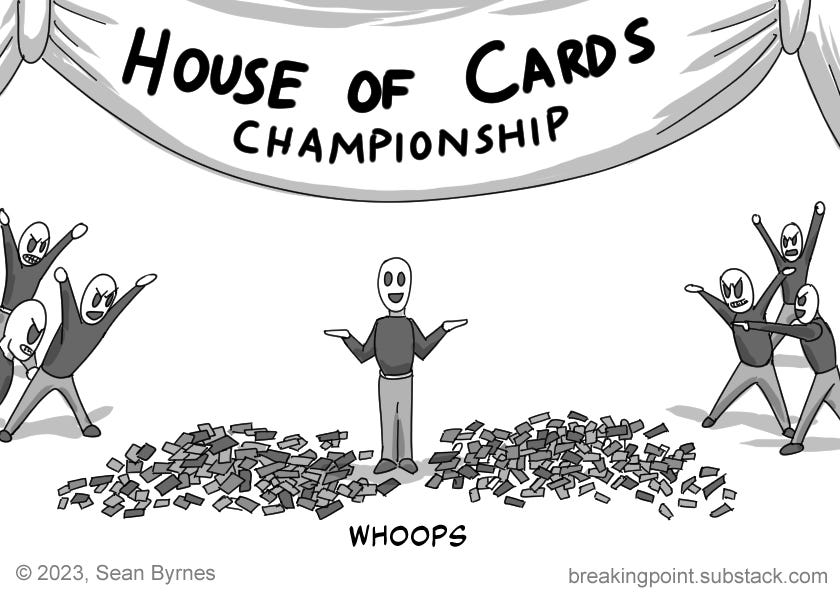If you liked reading this, please click the ❤️ button on this post so more people can discover it on Substack. Thanks!
I make a lot of mistakes. I used to think it was due to a lack of experience, but now that I have a lot of experience that excuse doesn’t work anymore! These days, I consider it my management style to try a lot of things and make mistakes on the path to finding success.
If you think about it, your business shouldn’t require perfect execution. If your business can’t survive a regular cadence of mistakes, then the foundation was not strong to begin with. When I look at some of the most successful companies of our time, I see a lot of mistakes that were (and still are) being made on their paths.
The question is not whether you’ll make mistakes, but how you handle them when you do.
Playing the Blame Game
Everyone’s first reaction is to assume that someone else made the mistake. We are all the heroes of our own stories, and so we consider all other options before blaming ourselves. Unfortunately, this leads to blame games and accusations that are unproductive and often toxic.
One of the best things you can do as a leader is to create a blame-free culture. When mistakes happen, have a zero tolerance policy for assigning blame. It doesn’t matter who is at fault, what matters is fixing the problem and ensuring it doesn’t happen again. This is a hard policy to create, because any tolerance of blame at all will undermine it completely.
You are also fighting the bad habits of most other companies, where mistakes lead to blame and blame leads to lost jobs. As a result, employees learn to play the blame game well to avoid being fired! If you want a blame free culture you are fighting all of this experience as well.
The good news is that you’ll make mistakes as a leader! Well, it’s not good news, but it does make it easier for you to create the blame-free culture you want. Everytime you make a mistake, own it! Talk about it in front of the company and remove the stigma around mistakes and avoid any aspect of blame.
Even so, it’s easy for a leader to own a mistake themselves. What about the people who work for you? You need to find ways to address mistakes in front of your team to make sure everyone sees that you don’t care about blame. I have gone so far as celebrating mistakes, and thanking employees for taking the risks that led to the mistakes. I know, that sounds crazy, but breaking such deep-seeded bad habits requires radical measures.
If you are successful, blame-free cultures become empowering. Your team will no longer hide mistakes, but readily report them so that they can be fixed and everyone moves on.
Only Make Mistakes Once
Even if your team is blame-free, you cannot afford to keep making the same mistakes over and over again. Repeat mistakes rob you of velocity and confidence, leading to more mistakes over time. If your team makes a mistake, you need to ensure it doesn’t happen again.
Many teams do “post-mortems” where they review projects (or big mistakes) after they are done to see what can be learned from them. This is a great practice, and I encourage it, but it’s hard to do a post-mortem on every single mistake since many will be small things.
Instead, I recommend having your team practice a “pre-mortem”. Before making a decision or taking an action, create a quick list of everything that might go wrong. This helps everyone apply lessons from previous mistakes, since you can easily recognize the same (potential) mistake happening again.
Like many things, this kind of practice is best as a habit and not a process. If your team develops the habit of doing pre-mortems, they will learn the lessons we need them to learn. If they only do it as part of a process so they can check it off and move on, few lessons will be learned. We need intentional learning, not someone going through the motions.
Even so…
Let’s be honest, even if you handle them well, mistakes hurt. They hurt even if there is no blame, and even if you only make them once. There are always new mistakes to be made, no matter what we do.
Acknowledging that reality, and making it part of your normal conversation, is important. We need to make sure mistakes are acceptable, typical features of business instead of scary things to be discussed in hushed tones. When we shine the light on mistakes they have no power over us anymore.
Speaking of which, while writing this I forgot to drop my son off at his team practice (seriously) so I need to leave right now! Always new mistakes to be made…
For more on Company Culture and Decision Making, see:




